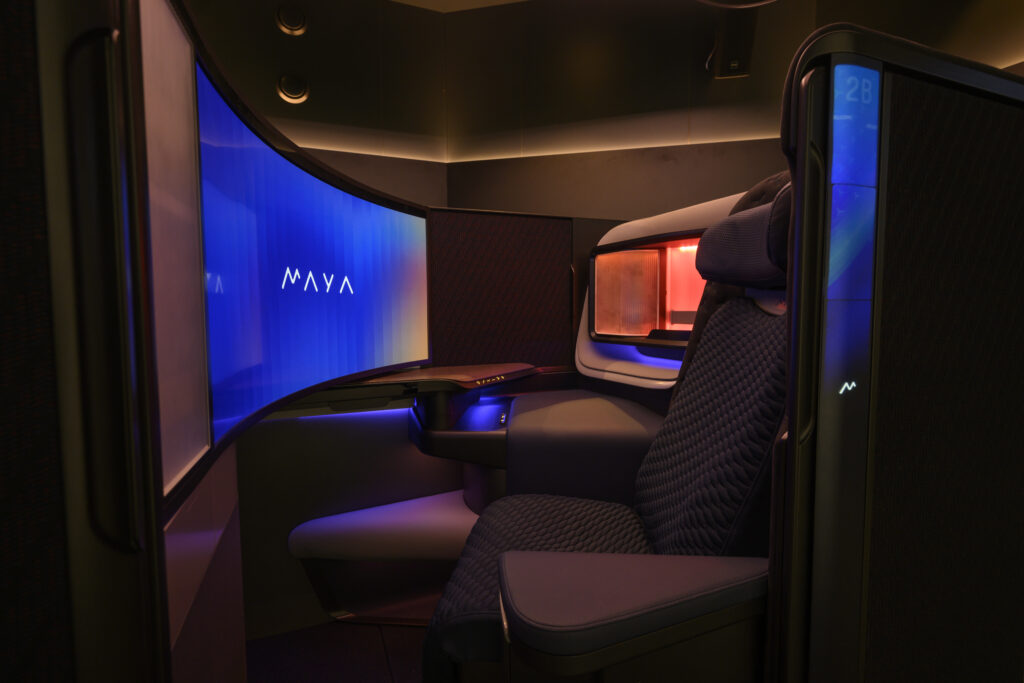AIX 2024: MAYA Business-Class Suite Concept Unveiled by Collins, Panasonic Avionics
Share

Collins Aerospace (Collins) and Panasonic Avionics have jointly unveiled MAYA, a new business-class suite concept focused on the next generation of millennial and Gen-Z travelers, at the 2024 Aircraft Interiors Expo in Hamburg.
During an in-depth demonstration of the suite, Collins’ VP and General Manager of Interiors Christoph Blanc said MAYA was designed from a clean sheet with four key pillars in mind: Comfort; an immersive experience; accessibility and sustainability.
In terms of providing comfort, Blanc explained that as well as being “ergonomically enhanced,” the seat is equipped with Collins’ active sensor system, ARISE, which “listens to the passenger’s body.” The system monitors body pressure and adjusts the seat cushions accordingly, as well as automatically utilizing the heating and cooling system based on a passengers’ body temperature.
The immersive component is afforded by the 45-inch ultra-wide, ultra-high-definition, curved OLED Astrova display with a headphone-less directional mirror audio system and complementary haptic feedback system in the seat.
During the initial unveiling, Ken Sain, Panasonic Avionics’ CEO, announced, “The 45-inch Astrova Curve OLED display is three times larger than typical screens and the first Ultra-Widescreen CinemaScope (21:9) display in the sky – the same screen format in cinemas. Based on seat geometry and viewing angles, MAYA delivers a 50 percent more immersive viewing experience than sitting in a theater and 30 percent more immersive than an IMAX.”
“The 45-inch Astrova Curve OLED display is … the first Ultra-Widescreen CinemaScope (21:9) display in the sky.”
Ken Sain, Panasonic Avionics
Panasonic Avionics’ VP Product Management Andy Masson went on to explore the in-flight entertainment technology in more detail. “What’s great about having a 21:9 display is it creates more different ways of integrating with a show. You no longer have to exit out of the movie to go and look at a map, you can bring those other things in while you’re watching.”
With a continuing emphasis on a personalized experience that appeals to digital natives, he also outlined a new feature integrated into the moving map experience allowing passengers the possibility to edit their own journey in terms of “bringing forward breakfast” or “sleeping through dinner” through the IFE screen; a journey they can then look back on throughout the flight.
Accessibility-wise, the suite uses an application called ADAPT that links with passengers’ electronic devices to provide full control of the seat and the IFE experience using “the same accessibility preferences you have on your phone.”
When it comes to sustainability, Blanc stated that artificial intelligence was enabling airlines to make small changes. “By looking at the passenger and seeing they’re going to rest, we can adapt the power supply consumption by turning the lights down or shutting down the screen.”
He also referenced the use of sustainable materials along with STARLight composite structures to reduce weight and improve product circularity, as well as modular design elements that would support mid-life upgrades while simplifying disassembly processes and recycling.
Collins’ STARLight structural technology, ARISE intelligent comfort system and ADAPT digital flight experience control, which all feature as part of MAYA, are finalists in the 2024 Crystal Cabin Awards. The existing Astrova IFE system has already been chosen by numerous airlines including Qatar Airways.


